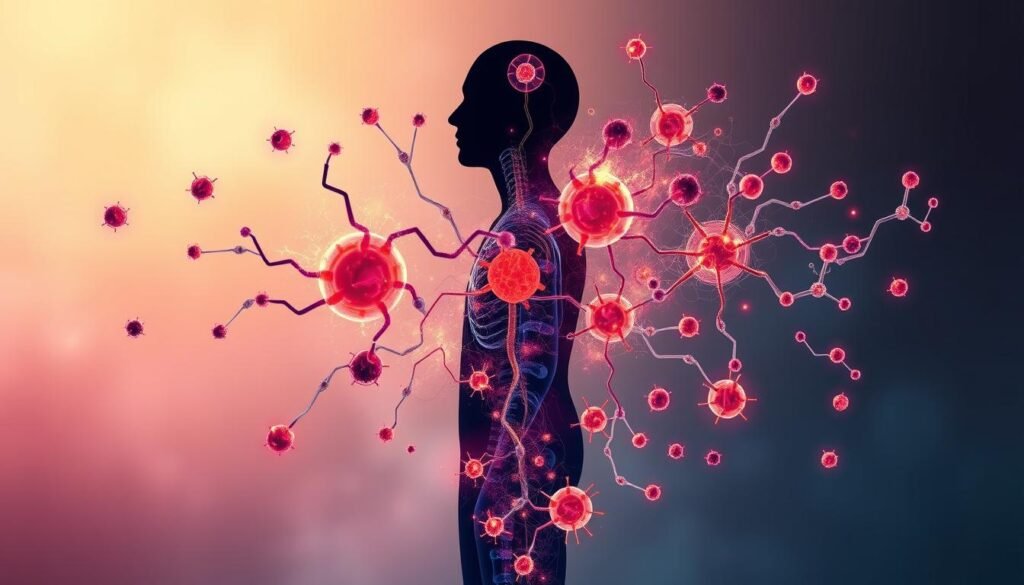Did you know a third of American adults will face an anxiety disorder in their lives? This fact shows why it’s important to know stress from anxiety. Though they may seem similar, knowing their differences is key for good mental health. Stress comes from outside pressure and goes away after. But anxiety sticks around, hurting how we live daily. By understanding these feelings, we can get the right help and improve our well-being.
Key Takeaways
- 1 in 12 adults struggle with anxiety, highlighting its prevalence.
- Stress can lead to serious mental health issues like depression or substance abuse.
- Symptoms such as panic attacks can indicate a potential anxiety disorder.
- Both stress and anxiety may result in significant physical health problems, including heart disease.
- Understanding the differences between stress and anxiety is crucial for effective coping strategies.
- Therapy, particularly Cognitive Behavioral Therapy (CBT), is highly effective for anxiety disorders.
Understanding Stress and Anxiety
Stress and anxiety are natural responses to life’s challenges. They affect our mental health in distinct ways. Stress comes from clear causes like job pressures, moving, or health issues. When stressed, you might feel your heart race, become moody, or swing in mood.
Anxiety, on the other hand, can linger without obvious reasons. It often leads to constant worry, seen in Generalized Anxiety Disorder. About 31% of people in the U.S. will face an anxiety disorder, says the National Institute of Mental Health.
It’s important to recognize signs of stress and anxiety. They can cause sleep problems, upset stomach, and focus issues. Not dealing with these signs can hurt your health and happiness.
Many ways can help manage stress and anxiety. Physical activities, breathing exercises, and relaxation can build your strength against them. Sharing your feelings with someone close can also help a lot. For overwhelming feelings, mental health experts can offer therapy or medicines.
| Aspect | Stress | Anxiety |
|---|---|---|
| Trigger | Specific situations (e.g., work deadlines) | May lack specific triggers |
| Duration | Typically short-term | Can be long-lasting |
| Common Symptoms | Faster heartbeat, moodiness, irritability | Excessive worry, irrational fears |
| Treatment Approaches | Relaxation techniques, physical activities | Cognitive-behavioral therapy, medication |
What Is Stress?
Understanding stress is key to knowing how it affects our daily life and health. Stress is how we physically or mentally react to outside pressures. These pressures can be one-time events or happen over and over again. It’s very important to know the different causes of stress. This helps with managing stress better.
Definition and Causes of Stress
Stress comes from both sudden and long-term pressures. When facing tight deadlines or personal disagreements, stress shows up as emotional and physical symptoms. Stress can come from many sources:
- Work-related pressures such as tight deadlines or difficult projects
- Financial challenges like debt or unexpected expenses
- Personal conflicts in relationships or family dynamics
- Health issues, particularly chronic illnesses
- Life changes such as moving or changing jobs
Long-term stress can lead to health issues like sleep problems, weakened immune system, heart problems, and anxiety. This shows how important it is to have good stress management skills.
Common Stressors in Daily Life
Everyday life comes with many stressors that can hurt our mental health. These include:
- High workplace demands leading to burnout
- Struggles with time management
- Interpersonal conflicts and social pressures
- Challenges in achieving work-life balance
Knowing these stressors helps in finding ways to deal with them. Writing in a journal, relaxing, staying active, and keeping a regular sleep schedule can all help. To understand the link between stress and anxiety, check out the differences between stress and anxiety.
https://www.youtube.com/watch?v=a-n2ZcgjLso&pp=ygUQI3N0cmVzc2FuZGF4aWV0eQ%3D%3D
What Is Anxiety?
Anxiety often feels like endless worry without a clear reason. To understand anxiety, we look at what it means and how it affects people. Around 1 in 12 adults are dealing with it, making it a common issue.
Definition and Characteristics of Anxiety
To really get what anxiety is, it’s key to know its signs. These signs make everyday tasks harder. They include:
- Restlessness: Feeling like you’re always on edge.
- Fatigue: Feeling tired all the time because of constant worry.
- Panic attacks: Sudden moments of intense fear with physical signs.
- Obsessive thoughts: Thoughts that won’t stop and seem overpowering.
Types of Anxiety Disorders
There are different types of anxiety disorders. Each has its own symptoms. Some well-known ones are:
- Generalized anxiety disorder: Worrying too much about different parts of life.
- Panic disorder: Having panic attacks often and fearing the next one.
- Social anxiety disorder: Feeling very anxious in social settings, making it hard to join in.
Knowing about these disorders is important. Nearly 40 million Americans have one. It’s key to remember, too much anxiety can mess with daily life. When stress hurts relationships or work, finding help can make a big difference.
What Is the Difference Between Stress and Anxiety
It’s vital to know how stress and anxiety differ. They have similar signs but their causes, how long they last, and how our body responds are not the same. Understanding these can help us handle them better and feel more at ease.
Direct Comparison of Symptoms
Anxiety and stress can both disrupt our lives.
Symptoms of anxiety include:
- Persistent worry
- Difficulty concentrating
- Panic attacks
- Physical symptoms such as increased heart rate and sweating
Stress, however, is usually triggered by specific events. Its symptoms include:
- Headaches
- Fatigue
- Difficulty sleeping
But stress is generally short-lived. Anxiety symptoms might stick around much longer, even when stressors are gone. This shows why it’s crucial to know the difference between the two.
Duration and Triggers
How long stress and anxiety last tells us a lot about them. Stress comes from facing immediate trouble and usually fades when the issue does. Stress can be sparked by things like tough deadlines, personal disagreements, or big changes in life.
Anxiety, though, might stick around. It can impact daily life for months without clear reasons. Knowing what triggers stress can help prevent or lessen anxiety.

Similarities Between Stress and Anxiety
It’s vital to understand how stress and anxiety are similar to manage them well. These two feelings often show the same signs, which confuses people. Signs like being easily upset and not being able to sleep show how stress can make anxiety worse.
Overlapping Symptoms and Reactions
Stress and anxiety can lead to both emotional and physical signs. People might get irritable or eat more or less when stressed or anxious. This makes it hard for some to tell the feelings apart, worsening their situation and possibly leading to long-term problems.
Emotional and Physical Responses
The emotional effects include feelings of fear, annoyance, or being overwhelmed. Likewise, the physical signs of stress and anxiety are similar. They include a faster heartbeat, trouble breathing, and stomach issues. These signs make people feel more worried and uneasy.
Seeing the similarities and subtle differences between stress and anxiety is key to dealing with them. Understanding personal experiences and using coping strategies can improve mental health. Techniques such as mindfulness and cognitive behavioral therapy help with symptoms. For more tips on handling stress and anxiety, check out this helpful link.
The Physiology of Stress
Stress involves complex biological reactions that ready the body for action. It kicks off the fight or flight response, crucial for survival. When stressed, the brain tells the adrenal glands to pump out adrenaline and cortisol.
These hormones cause the heart to beat faster, raise blood pressure, and send blood to muscles. This gets the body ready to respond quickly. The response boosts alertness and energizes the body to either confront or run from dangers.
Understanding stress responses shows how constant stress can harm health. Long-term stress keeps the body in constant alert, harming bodily functions. It can lead to heart diseases, mental issues, and other health problems.
It’s important to know the signs of stress for better management. Stress shows up in thoughts, feelings, body, and behavior. Recognizing these signs is key to good health. Learning to manage stress improves life and health significantly.
| Type of Stress | Description | Potential Impacts |
|---|---|---|
| Acute Stress | Short-term stress caused by immediate challenges or traumatic events. | Increased heart rate, temporary anxiety. |
| Chronic Stress | Prolonged stress persisting over time, often due to ongoing difficulties. | Heightened risk of cardiovascular issues, anxiety, and depression. |
| Episodic Acute Stress | Frequent episodes of acute stress, often linked to unpredictable demands. | Interference with daily activities, increased irritability. |
| Eustress | Positive stress that can motivate and energize. | Improved focus, increased productivity. |

The Physiology of Anxiety
Understanding anxiety’s physiology shows how our body reacts to stress. When faced with anxiety, our body gets ready for threats. This link between our feelings and body responses shows how deeply anxiety affects us.
How the Body Responds to Anxiety
Anxiety triggers our stress response system and changes hormone levels. This leads to several body reactions. Symptoms of anxiety often include:
- Heightened awareness and sharper alertness
- Rapid heartbeat, causing a feeling of urgency
- Changes in breathing patterns, leading to fast breaths
- Feelings of unease or dread, affecting everyday life
- Gastrointestinal issues like nausea or upset stomach
The body and emotions interact complexly during anxiety. It’s important to recognize how these symptoms can impact life.
For those facing anxiety, finding treatment helps. Psychotherapy and medication are effective in managing symptoms. For more info on anxiety disorders, visit this resource.
Coping Mechanisms for Stress Management
It’s key to manage stress for a healthy life and to stop anxiety. Many ways can help us cope with stress well. They let us plan our life better. Trying out physical activities and mindfulness are really helpful.
Physical Activities and Their Benefits
Staying active is one of the top ways to deal with stress. Working out releases tension and boosts happy chemicals in our brain. Here are some great stress-reducing activities:
- Walking or jogging in nature
- Yoga and pilates
- Dancing or participating in group sports
- Swimming or cycling
Adding these activities to your daily life fights stress. Being active makes you stronger emotionally. It helps you face life’s ups and downs better. For tips on how to start, visit this resource.
Breathing Techniques and Mindfulness
Mindfulness and breathing exercises can lower stress a lot. They shift your focus from worries to peace. Simple methods like deep breathing or relaxing your muscles work wonders. Consider these techniques:
- Deep Breathing Exercise: Breathe in deeply through your nose for four counts, hold it for four, then slowly exhale through your mouth for six counts.
- Box Breathing: Inhale for a count of four, hold for four, exhale for four, and hold again for four before starting over.
- Meditative Breathing: Pay attention only to your breathing. Let other thoughts go as you breathe in and out.
Using these breathing methods daily helps control stress. Just a few minutes of mindfulness each day can really improve your mental health. For insights on mindfulness, look into this guide.

Coping Mechanisms for Anxiety Relief
Finding ways to cope with anxiety is key to feeling better emotionally. Many people deal with triggers like work stress, relationship issues, and big changes in life. Knowing what triggers your anxiety is the first step to managing it well.
Cognitive Behavioral Therapy (CBT) is a top approach for treating anxiety. It helps change negative thoughts and actions. Joining support groups can also help by sharing experiences and getting support from others who understand.
Having supportive friends and family is important for dealing with anxiety. Studies show that good social ties can lessen the bad effects of stress. Doing things that relax you, like exercise and mindfulness, also helps a lot. Mindful meditation can especially help the brain fight off anxious thoughts.
Staying active and getting enough sleep are key for easing anxiety too. These habits improve your physical health and control stress hormones, which helps your mind stay calm. Changing your daily routine a bit can make coping strategies more effective.
Here’s a detailed table of different ways to cope with anxiety, their benefits, and how to do them:
| Coping Mechanism | Benefits | Techniques |
|---|---|---|
| Cognitive Behavioral Therapy | Reduces negative thought patterns | Talk therapy sessions |
| Emotional Support Groups | Shared experiences and encouragement | Group meetings and discussions |
| Mindfulness | Improves emotional regulation | Meditation and breathing exercises |
| Exercise | Enhances physical health and mood | Regular workouts and physical activities |
| Nutrition | Supports overall mental well-being | Balanced diet and health supplements |
| Journaling | Provides emotional release | Regular writing sessions |
Trying different coping methods lets people find what works best for them. Looking for help through resources like anxiety relief strategies can be a big step towards better mental health.
When Stress Becomes Anxiety
It’s really important to know when stress turns into anxiety to keep your mental health in check. For those dealing with ongoing stress, it’s possible to start seeing signs of anxiety. Seeing these signs early is key in taking care of your mental health.
Signs and Warning Signals
Various symptoms can show that stress is turning into more serious anxiety. Common signs include:
- Persistent worrying that feels out of control
- More irritability and mood swings
- Problems focusing or making choices
- Sleep issues, like not being able to sleep or sleeping too much
- Physical problems like faster heartbeat, headaches, and stomach issues
When these signs of anxiety get stronger, they can really impact daily life. This makes it vital to get help.
Seeking Professional Help
Knowing when stress has become anxiety isn’t always easy. Getting professional help for anxiety early is crucial. Treatments like cognitive-behavioral therapy (CBT) are effective in managing anxiety disorders. They teach how to handle stress better and be stronger against future stress.
It’s better to act early to avoid worse problems. Knowing that ongoing stress can turn into serious anxiety is crucial for your health. If you start to see the early signs, it’s important to get professional help right away.
Long-term Effects of Prolonged Stress and Anxiety
Chronic stress and anxiety can lead to severe health issues over time. They significantly affect mental and physical health. Knowing these effects helps motivate people to care for their well-being.
Mental Health Implications
Long-term stress can cause serious mental health implications. It may lead to anxiety disorders and depression. About 6.8 million adults in the U.S. have generalized anxiety disorder. This problem is quite common.
Chronic stress can also cause muscle tension, insomnia, and social isolation. These issues can make the condition worse.
Physical Health Consequences
Long-term stress and anxiety have serious physical consequences too. They are linked to heart disease, high blood pressure, stroke, and digestive problems. Sleep troubles are common, which lead to stress-related insomnia.
This creates a cycle of health problems. Constant stress can also cause weight gain. This happens due to hormonal changes brought on by stress. It affects a person’s overall health badly.
Strategies to Improve Mental Health
Improving mental health takes work and good tactics. Mindfulness techniques help us stay in the moment and manage stress. Also, building social support can make our emotions stronger. These steps build a strong base for mental toughness.
Mindfulness Techniques and Therapy
Mindful practices are key for mental health. They help us look at our thoughts and feelings without judging them. Meditation, deep breathing, and yoga lower stress and help us relax. Therapy, like cognitive-behavioral therapy (CBT), works well with mindfulness. It teaches us to change anxious thoughts and handle stress better.
Importance of Social Support
Social support is crucial for better mental health. Being connected with family, friends, and others helps us during tough times. Talking about our challenges makes us feel we belong and less alone. This makes us stronger and gives us new views when stressed. Keeping these bonds strong is vital for our mental health.
Conclusion
The talk about stress and anxiety shows the key differences between them. Stress comes from things like work or home tasks. It makes us uncomfortable but goes away after the problem is solved. Anxiety is different. It is a constant feeling of worry and fear, even without a clear reason. Knowing this can help us take care of our mental health better.
Noticing the signs of anxiety is important. Signs include a fast heartbeat or sweating. To handle stress and anxiety, try to stay active, eat well, and get support from loved ones. Therapy, especially cognitive-behavioral therapy, can also help a lot. For tips on spotting anxiety, you can look at this resource.
It’s key to be proactive in dealing with stress and anxiety for our mental health. If these feelings don’t go away, getting help is important. This way, we can live better lives without the heavy load of emotional problems.